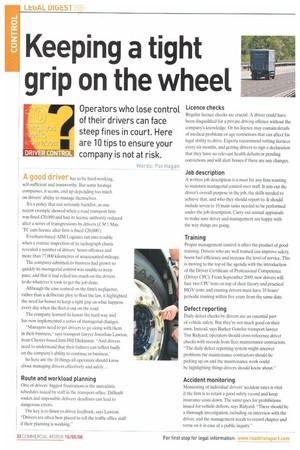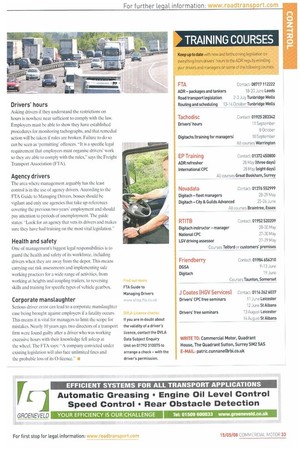Keeping a tight grip on the wheel
Page 32

Page 33

If you've noticed an error in this article please click here to report it so we can fix it.
Operators who lose control of their drivers can face steep fines in court. Here are 10 tips to ensure your company is not at risk.
Words; Pat Hagan A good driver has to be hard-working, self-sufficient and trustworthy. But some haulage companies, it seems, end up depending too much on drivers' ability to manage themselves.
Ifs a policy that can seriously backfire, as one recent example showed when a road transport firm was fined £20,000 and had its license authority reduced after a series of transgressions by drivers (CM I May, 'TC cuts licence after firm is fined £20,000').
Evesham-based AIM Logistics ran into trouble when a routine inspection of its tachograph charts revealed a number of drivers' hours offences and more than 77,000 kilometres of unaccounted mileage.
The company admitted its business had grown so quickly its managerial control was unable to keep pace, and that it had relied too much on the drivers to do whatever it took to get the job done.
Although the case centred on the firm's negligence, rather than a deliberate ploy to flout the law, it highlighted the need for bosses to keep a tight grip on what happens every day when the fleet is out on the road.
The company learned its lesson the hard way and has now implemented a series of managerial changes.
"Managers need to get drivers to go along with them in their business," says transport lawyer Jonathan Lawton, from Chester-based firm Hill Dickinson. "And drivers need to understand that their failures can reflect badly on the company's ability to continue in business.'
So here are the 10 things all operators should know about managing drivers effectively and safely...
Route and workload planning One of drivers' biggest frustrations is the unrealistic schedules issued by staff in the transport office. Difficult routes and impossible delivery deadlines can lead to dangerous errors.
The key is to listen to driver feedback, says Lawton. "Drivers are often best placed to tell the traffic office staff if their planning is working." Licence checks Regular licence checks are crucial. A driver could have been disqualified for a private driving offence without the company's knowledge. Or his licence may contain details of medical problems or age restrictions that can affect his legal ability to drive. Experts recommend vetting licences every six months, and getting drivers to sign a declaration that they have no relevant health defects or pending convictions and will alert bosses if there are any changes.
Job description A written job description is a must for any firm wanting to maintain managerial control over staff. It sets out the driver's overall purpose in the job, the skills needed to achieve that, and who they should report to. It should include seven to 10 main tasks needed to be performed under the job description. Carry out annual appraisals to make sure driver and management are happy with the way things are going.
Training Proper management control is often the product of good training. Drivers who are well trained can improve safety, boost fuel efficiency and increase the level of service. This is moving to the top of the agenda with the introduction of the Driver Certificate of Professional Competence (Driver CPC). From September 2009, new drivers will face two CPC tests on top of their theory and practical HGV tests; and existing drivers must have 35 hours' periodic training within five years from the same date.
Defect reporting Daily defect checks by drivers are an essential part of vehicle safety. But they're not much good on their own. Instead, says Barker Gotelee transport lawyer Tim Ridyard, operators should cross-reference driver checks with records from fleet maintenance contractors. "The daily defect reporting system might uncover problems the maintenance contractors should be picking up on and the maintenance work could be highlighting things drivers should know about."
Accident monitoring Monitoring of individual drivers' accident rates is vital if the firm is to retain a good safety record and keep insurance costs down. The same goes for prohibitions issued for vehicle defects, says Ridyard. "There should be a thorough investigation, including an interview with the driver, and the management needs to record chapter and verse on it in case of a public inquiry." Drivers' hours Asking drivers if they understand the restrictions on hours is nowhere near sufficient to comply with the law. Employers must be able to show they have established procedures for monitoring tachographs, and that remedial action will be taken if rules are broken. Failure to do so can he seen as 'permitting' offences. "It is a specific legal requirement that employers must organise drivers' work so they are able to comply with the rules," says the Freight Transport Association (VIA).
Agency drivers The area where management arguably has the least control is in the use of agency drivers. According to the FTA Guide to Managing Drivers, bosses should be vigilant and only use agencies that take up references covering the previous two years' employment and should pay attention to periods of unemployment. The guide states: "Look for an agency that vets its drivers and makes sure they have had training on the most vital legislation."
Health and safety One of management's biggest legal responsibilities is to guard the health and safety of its workforce, including drivers when they are away from the depot. This means carrying out risk assessments and implementing safe working practices for a wide range of activities, from working at heights and coupling trailers, to reversing skills and training for specific types of vehicle gearbox.
Corporate manslaughter Serious driver error can lead to a corporate manslaughter case being brought against employers if a fatality occurs. This means it is vital for managers to limit the scope for mistakes. Nearly 10 years ago, two directors of a transport firm were found guilty after a driver who was working excessive hours with their knowledge fell asleep at the wheel. The F1'A says: "A company convicted under existing legislation will also face unlimited fines and the probable loss of its 0-licence." •




























































































































































































